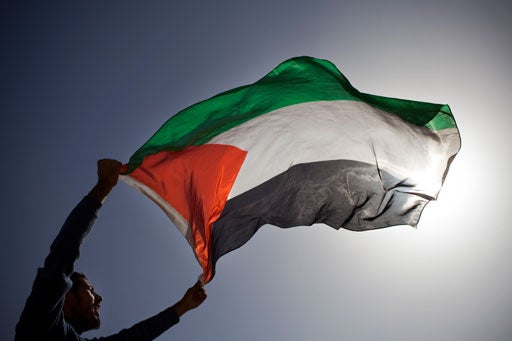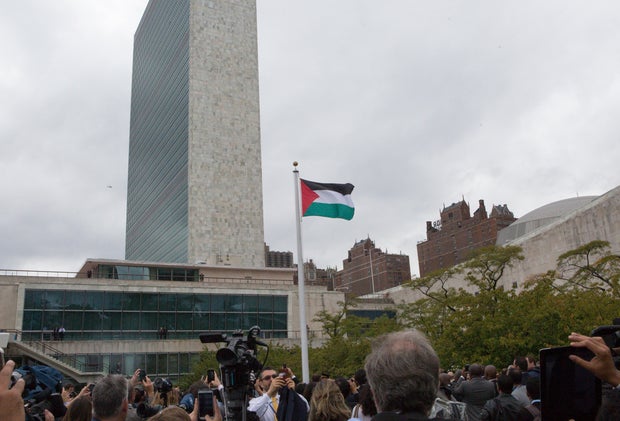Paris — Israel’s more than seven-month war in Gaza since the October 7 attack has revived a global push for the Palestinians to obtain a state of their own. Norway, Spain and Ireland, all announced plans on Wednesday recognize a State of Palestine, breaking with the long-standing position of Western powers that a Palestinian state can only emerge as part of a negotiated peace with Israel.
According to the Palestinian Authority, which has limited powers in parts of the occupied West Bank, 142 of the 193 member countries of the United Nations already recognize a State of Palestine. They include many countries in the Middle East, Africa and Asia, but not the United States, Canada, most of Western Europe, Australia, Japan or South Korea.
In April, the United States used its veto on the United Nations Security Council to block a Palestinian bid to become a full UN member state.
AP/Bernat Armangue
Below is a look back at the Palestinians’ search for a state and which countries already recognize a State of Palestine:
A Palestinian declaration and initial acknowledgments
On November 15, 1988, during the first Palestinian intifada or uprising, Palestinian leader Yasser Arafat unilaterally proclaimed an independent Palestinian state with Jerusalem as its capital.
He made the announcement in Algiers, at a meeting of the exiled Palestinian National Council, which adopted as its objective a two-state solution, with independent Israeli and Palestinian states coexisting side by side.
Minutes later, Algeria became the first country to officially recognize an independent Palestinian state.
Within weeks, dozens of other countries, including much of the Arab world, India, Turkey, most of Africa and several countries in Central and Eastern Europe, followed suit.
The next wave of recognitions occurred in late 2010 and early 2011, at a time of crisis in the Middle East peace process. A number of South American countries, including Argentina, Brazil and Chile, have responded to calls from Palestinians to support their demands for statehood.
This came in response to Israel’s decision to end the temporary ban on the construction of Jewish settlements in the occupied West Bank.
UNESCO recognizes Palestine, to the anger of the US and Israel
In 2011, with peace talks at a standstill, the Palestinians decided to move forward with a campaign for full UN membership for a State of Palestine.
The mission failed, but, in a groundbreaking move on October 31 of that year, the UN cultural agency, UNESCO, voted to accept the Palestinians as full members.
The decision triggered a furious reaction from Israel and the United States, which suspended funding for the Paris-based organization.
They leave UNESCO definitively in 2018, although the USA rejoined in 2023.
In September 2015, the Palestinian flag was raised for the first time at the United Nations in New York, after the General Assembly, several years earlier, voted overwhelmingly to elevate the status of Palestinians to a “non-member observer state”.
Luiz Rampelotto/Pacific Press/LightRocket/Getty
Three years later, the International Criminal Court also accepted Palestine as a State Party. The ICC’s chief prosecutor announced Tuesday that he was seeking arrest warrants to Israeli Prime Minister Benjamin Netanyahu and his Defense Minister, along with three top Hamas leaders, regarding suspected war crimes committed on October 7 and since then in Israel and Gaza.
Sweden leaves the pack
In 2014, Sweden, which has a large Palestinian community, became the first EU member in Western Europe recognize a Palestinian state.
The move came after months of almost daily clashes in East Jerusalem, annexed by Israel.
The State of Palestine had already been recognized by six other European countries – Bulgaria, Cyprus, Czech Republic, Hungary, Poland and Romania.
Israel reacted angrily to Stockholm’s move, with then-Foreign Minister Avigdor Lieberman telling the Swedes that “relations in the Middle East are much more complex than self-assembled IKEA furniture.”
War in Gaza increases support for Palestinian state
Israel’s relentless offensive in Gaza, which left at least 35,647 people dead, according to the Ministry of Health in the Hamas-administered territory, in retaliation for the Hamas killing of more than 1,170 people in Israel on October 7, has revived support in Europe to the Palestinians. state.
Norway, Spain and Ireland said they will recognize a Palestinian state by May 28, defying threats from Israel, which recalled its Irish and Norwegian envoys for discussions on the measure.
Malta and Slovenia, in March, also expressed “readiness to recognize Palestine” when “the circumstances are appropriate”.
Australia has also recently floated the possibility of unilaterally supporting the creation of a Palestinian state.
President Emmanuel Macron also said that the issue of recognizing a Palestinian state without a negotiated peace is no longer “a taboo for France”.

























